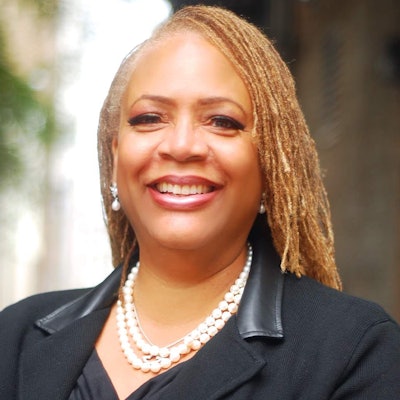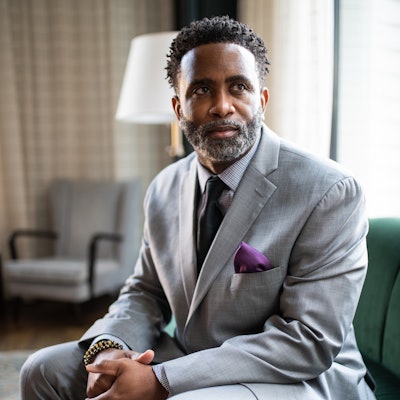In 1982, Dr. Regina Dixon-Reeves was just about to graduate with her bachelor's degree from Marquette University. As with most graduates, she had been fielding questions about what she intended to do after college.
She had no idea.
But one day, walking up a hill on campus at the corner of 21st Street and Wisconsin Avenue, it hit her like a lightning bolt.
“I want to be a college president,” Dixon-Reeves said.
 Dr. Regina Dixon-Reeves
Dr. Regina Dixon-Reeves
The brilliancy of the moment, the direction she suddenly felt, was paused by her next immediate thought: “I don’t even know how to do that. How does one do that?”
Thirty-five years later, Dixon-Reeves applied to join the first cohort of Rutgers University Minority Serving Institutions (MSIs) Aspiring Leaders program, a two-year long course that brings the next generation of MSI presidents together with current or retired MSI presidents, creating a culture of familiarity, openness, and curiosity that has led to the program’s success.
In just five years, 50% of participants have been promoted at their current institution or another institution. The program is now accepting applications for its third cohort through Oct. 15. Since opening the application, it has received three times the usual number of applicants.
According to the most recent data collected by the American Council on Education, 58% of sitting college presidents are over the age of 60, and 70% are men. Eighty-three percent (83%) are white, 8% are Black, 4% Latinx, and AANAPI or Middle Eastern leaders each make up only 1%. With more presidents retiring, new leaders have the chance to fill their shoes.
Dr. Marybeth Gasman, executive director of the Rutgers Center for MSIs, saw what was happening at colleges and universities across the nation.
“I saw the turnover at HBCUs (historically Black colleges and universities), I saw HSIs growing rapidly (Hispanic-Serving Institutions), and thought, 'Wouldn’t it be great to have a program that focuses on MSIs overall? Get people cross-pollenating, working together, and give them the opportunity for great mentorship?”
 Dr. Marybeth Gasman
Dr. Marybeth Gasman
Aspiring MSI leaders come from all kinds of institutions and backgrounds. Together, they embark on two years of virtual and in-person programming with an assigned mentor. Topics covered include fundraising, creating a budget, learning how to maintain facilities, working with faculty members, learning how to manage a crisis, developing good relationships with board of trustees and learning how to effectively use media to promote an institution. Discussions also focus on work-life balance. Cohorts are small, less than 20 people, because, Gasman said, she likes for her programs to be hands-on.
There are at least 20 current or former presidents who currently hold the title of mentor for the growing initiative. They are involved in the process of teaching and advising each cohort. Sometimes, mentors will play-act as hard-to-get donors in staged scenarios, where aspiring presidents will make the tough ask for much-needed funding.
“We try to think about what kind of institutions they are interested in leading,” said Gasman, of the process of pairing mentors with cohort members. “We think about gender, geography, expertise.”
These pairings have, for many participants, created magic.
Dr. Levon T. Esters participated in the first cohort when he was an associate professor of education at Purdue University. He was paired with Dr. Elmira Mangum, the former president of Florida A&M University. What started as a mentorship connection blossomed into a true friendship, something not uncommon between mentor and mentees in this program.
“For me, as a Black man, being able to learn from a Black woman about the nuances of leadership, and how a woman approached leadership, that’s something I’m glad I’ve had the chance to do,” said Esters. “Being able to learn from so many leaders who themselves were at MSIs, that were Black, white, women, and men. You learn from a lot of different folks who come from different backgrounds.”
 Dr. Levon T. Esters
Dr. Levon T. Esters
Leading an MSI is a singular experience, different from leading a Predominately White Institution (PWI), for many reasons. One of those reasons, Esters said, is funding.
“Positioning MSIs to thrive—for faculty, staff and students to thrive—it takes a unique leader to really understand the needs of MSIs, and how and what it takes to position them so that they can take advantage of [the funding] available to PWI counterparts,” he added.
At the end of every two-year cycle, Gasman and her team collect data from their program. They also conduct exit interviews. Their latest research, released just this week, confirmed that most aspiring MSI leaders want to lead because they are keen to giving back to students of color.
“One thing we learned from the research is that young, aspiring leaders are craving opportunities to learn, but they aren’t always given them, especially women of color,” said Gasman. “They crave them, ask for them, but they don’t get them.”
With the coronavirus pandemic and incidents of racial unrest, 2020 created an opportunity for every leader and learner in the program to witness crisis management firsthand. Watching leaders take their colleges through such incredibly trying times was, “phenomenal,” Gasman said.
During the height of the COVID-19 crisis, all in-person events were cancelled, and virtual programming was created. Cohort participant Dr. Monte Randall, applied to fill the role of president at the College of the Muscogee Nation after President Robert Bible, a longtime leader of the college and the Muscogee community, died in December 2020 after contracting the virus.
“It was very emotional,” said Randall. “We’re a very close community, a small college. We all know each other. It was a tough, tough transition.”
Randall said that the support of his aspiring MSI leader network helped prepare him to fill the role.
Now as president, he continues to reach out whenever he needs mentorship or guidance.
“This isn’t the ideal situation anyone wants to come into, but knowing the enormous amount of responsibility, I felt prepared,” said Randall. The program, he said, "gave me the confidence to step into this role, make it my own.”
Randall, Esters, and Dixon-Reeves all agreed the mentorship they received from the program was transformational. Esters was promoted to full professor and is now the associate dean for diversity, equity and inclusion, and faculty affairs at Purdue. Dixon-Reeves is beginning her new role as vice provost for diversity, equity and inclusion at the University of San Diego.
The lessons she learned from the program have provided the “scaffolding,” she said, to prepare her her new role, even as she readies herself to someday become an MSI president.
Liann Herder can be reached at [email protected].



















